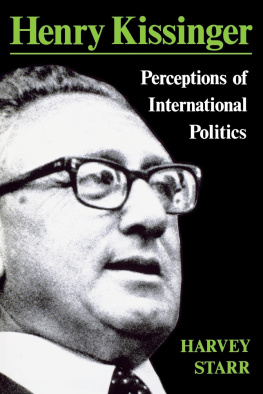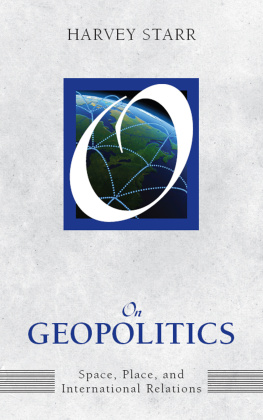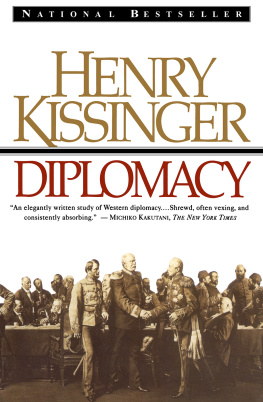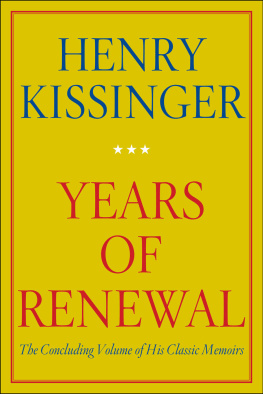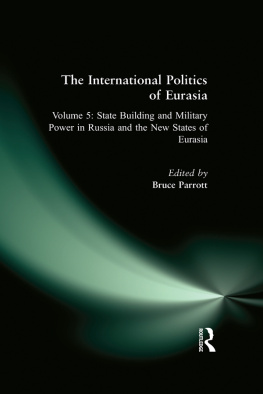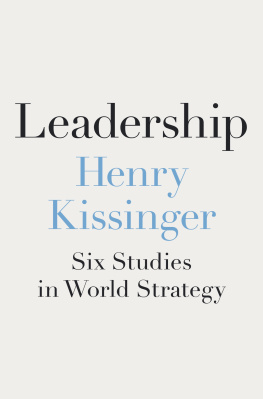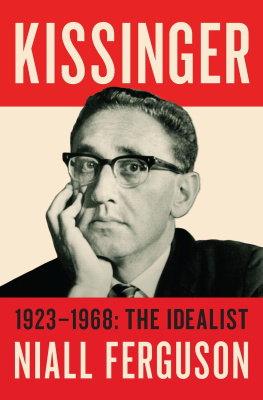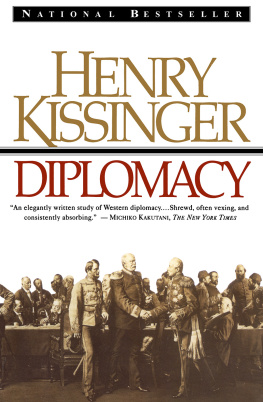Henry Kissinger
HENRY
KISSINGER
Perceptions of
International
Politics
HARVEY STARR
Copyright 1984 by The University Press of Kentucky
Scholarly publisher for the Commonwealth,
serving Bellarmine College, Berea College, Centre
College of Kentucky, Eastern Kentucky University,
The Filson Club, Georgetown College, Kentucky
Historical Society, Kentucky State University,
Morehead State University, Murray State University,
Northern Kentucky University, Transylvania University,
University of Kentucky, University of Louisville,
and Western Kentucky University.
Editorial and Sales Offices: Lexington, Kentucky 40506-0024
Library of Congress Cataloging in Publication Data
Starr, Harvey.
Henry Kissinger: perceptions of international politics.
Includes index.
1. Kissinger, Henry, 1923 . 2. United States
Foreign Relations1945 . 3. World politics
1945 . I. Title.
E840.8.K58S73 1983 327.73 83-16747
ISBN: 978-0-8131-5463-3
To JOHN V. GILLESPIE
in recognition of
his support for this project
Contents
Illustrations
Tables
Acknowledgments
A number of acknowledgments must be made to the individuals and institutions without whose support this research would not have been possible. Special thanks and appreciation are owed to John V. Gillespie, whose unflagging interest in this project was instrumental to its pursuit. This book is dedicated to his memory.
The Center for International Policy Studies at Indiana University, under Grant 750-0514 from the Ford Foundation, provided support for this research through a Faculty Research Seed Grant and a Supplementary Research Grant. A number of other typing and reproduction services have also been afforded to me by the center. Additional monetary support was provided by Indiana University through a Summer Faculty Fellowship. I would also like to thank Professor Edward E. Azar, then at the University of North Carolina at Chapel Hill, and now at the University of Maryland, for generously providing events data from the Conflict and Peace Data Bank (COPDAB). The Indiana University Department of Political Science Data Laboratory, under Director Ronald Weber, also provided assistance in data preparation, keypunching, and programming. Finally, in offering me a Leverhulme Fellowship, the Department of Politics of the University of Aberdeen, Scotland, provided me with a congenial setting for drafting major portions of the original manuscript.
I would also like to acknowledge my great debt to Professor Ole R. Holsti, who afforded me invaluable guidance at a number of points during the course of this research. Numerous colleagues at Indiana University and elsewhere provided comments on earlier drafts and presentations, copies of their own papers on various aspects of this work, and encouragement. To begin to name all these people would be to risk omitting some. You all know who you are, and have my heartfelt thanks. In the end, it was the help of William Jerome Crouch, editor of the University Press of Kentucky, and of a set of anonymous reviewers, that made the final version of this book possible.
Finally, I am grateful to a group of research assistants whose hard work and enthusiasm would be difficult to surpass. They are Constance H. Cole, Margot Meeks, Martin Sampson, Gregory Sanjian, and most especially Paul Hagner. This book is a product of a research process nourished by the above individuals and institutions.
PART I
Henry Kissinger:
Biographical and
Psychological Study
The Study of
Henry Kissinger:
Why and How
In his Harvard senior thesis, The Meaning of History, Henry Kissinger observed that, Everybody is a product of an age, a nation, and environment. But beyond that, he constitutes what is essentially unapproachable by analysis, the form of the form, the creative essence of history, the moral personality. However, the personalities of foreign-policy decision makers are not essentially unapproachable by analysis. Although the decision maker is, indeed, difficult to study, there are ways one can approach understanding the individual and can gain access to his personality as revealed in his thoughts, ideas, and beliefs. This book is an application of these approaches to the study of one particular policymaker, Henry Kissinger.
To begin, I use and merge biographical and psychobiographical studies of Henry Kissinger. Through the use of secondary sources, such as the biographies by Marvin and Bernard Kalb, David Landau, Ralph Blumenfeld, Dana Ward, and Bruce Mazlish, a chronology of the important events of Kissingers life and other psychobiographical traces may be identified. In addition, the large body of Kissingers professional, prepublic office, academic writings also contains clues to the nature of the subsequent foreign-policy decision maker. These academic works can be studied through the use of an operational code framework that identifies their authors political belief system. My operational-code analysis also draws heavily from works that were concerned with Kissingers writings, especially those of Stephen Graubard, Peter Dickson, John Stoessinger, and Mazlish, and the work of Stephen Walker.
My initial goal is not only to set out Kissingers belief system as delineated by operational-code analysis, but also to examine how the belief system derives from the individuals personality as it was formed in childhood, adolescence, and young manhood. This goal is directly relevant to the first half of the general, integrative theme of this work, which is a description of 1) Henry Kissingers belief system and 2) a specific aspect of that belief systemhis images of opponents. Subsidiary themes addressed in various sections of the book include the developmental background for that belief system, how images of the opponent relate to behavior, and the methodological problems associated with the understanding of these topics.
Just as Kissinger the child/adolescent/young man and Kissinger the academic left traces that could be analyzed, so did Kissinger the policymaker. As a policymaker, Kissinger made numerous public statements and performed numerous public acts that could be studied. To identify Kissingers images of contemporary opponents, I apply formal content analysis (evaluative assertion analysis) to the public statements of Kissinger the foreign-policy decision maker. This analysis focuses as well upon U.S. foreign policy during Kissingers policy-making tenure, in order to reveal the relationship between his belief system and the nations eventual foreign policy.
KISSINGER AS SUBJECT: FOREIGN-POLICY ACTOR
Henry Kissinger was the key presidential adviser on foreign policy under two presidents; therefore, a study of Kissinger is necessarily a study of American foreign policy. In this book, the emphasis is upon the Nixon-Kissinger foreign policy as it concerned the triangular or triadic framework of American, Soviet, and Chinese relations. These relations are studied using Kissingers images of the Soviet Union and the Peoples Republic of China, as well as events data that describe each states behavior toward the other two. The Nixon-Kissinger years were dramatic: they encompass the Chinese-American breakthrough and the growing era of U.S. dtente with the Soviet Union. The eventual extrication of the U.S. from the trauma of Indochina, U.S. policy in the Middle East after the fourth war within twenty-five years, and the eventual cooling down of dtente during the Ford presidency were also based upon policies developed by the Nixon-Kissinger team.


